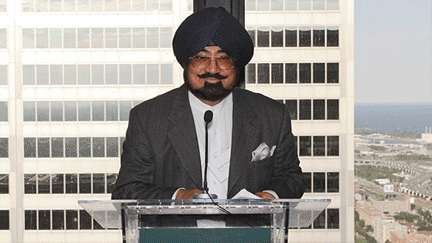Afghan love story film nominated at Sydney Film festival
August 17th, 2014
 An Afghan short documentary film based on true love story has been nominated at Sydney Film festival (SFF) 2014. Produced and directed by Afghan-Australian filmmaker Amin Palangi, ‘Love Marriage in Kabul’, is a story about an Afghan-Australian woman ManbodaRawi, who fights for a love marriage. ‘Love Marriage in Kabul’ is among 10 Australian documentary films contending for USD 10,000 Documentary Australia Foundation Award. Rawadi is a Sydney sider who set up an orphanage in Kabul after the death of her son. “The story follows Mahboda Rawi as she fights for a love marriage to happen in Kabul between one of the first orphans she has rescued, and the girl next door,” said Panagi, reported media. Palangi, who shuttled between Afghanistan and Kabul for documentary film, said he hopes ‘Love Marriage in Kabul’ enlighten audience about the different facets and challenges of marriage. “The audience that I had in mind for this story was an audience who are not necessarily Afghani to be honest,” said Palangi. He further said, “I made this film because there were a lot of stereotypes about Afghanistan, especially Afghani women, and I think that through this story – because it is a love story essentially – that Australian audiences and international audiences will hopefully connect with the story in a different way.” Palangi added that he aimed to show the power of women in Afghanistan through this film. “I am hoping to showcase the enthusiasm and power of this women. When you see the way she negotiates her way around Afghanistan, the way pushes men around, she’s very different to what you would normally see,” added Palangi.
An Afghan short documentary film based on true love story has been nominated at Sydney Film festival (SFF) 2014. Produced and directed by Afghan-Australian filmmaker Amin Palangi, ‘Love Marriage in Kabul’, is a story about an Afghan-Australian woman ManbodaRawi, who fights for a love marriage. ‘Love Marriage in Kabul’ is among 10 Australian documentary films contending for USD 10,000 Documentary Australia Foundation Award. Rawadi is a Sydney sider who set up an orphanage in Kabul after the death of her son. “The story follows Mahboda Rawi as she fights for a love marriage to happen in Kabul between one of the first orphans she has rescued, and the girl next door,” said Panagi, reported media. Palangi, who shuttled between Afghanistan and Kabul for documentary film, said he hopes ‘Love Marriage in Kabul’ enlighten audience about the different facets and challenges of marriage. “The audience that I had in mind for this story was an audience who are not necessarily Afghani to be honest,” said Palangi. He further said, “I made this film because there were a lot of stereotypes about Afghanistan, especially Afghani women, and I think that through this story – because it is a love story essentially – that Australian audiences and international audiences will hopefully connect with the story in a different way.” Palangi added that he aimed to show the power of women in Afghanistan through this film. “I am hoping to showcase the enthusiasm and power of this women. When you see the way she negotiates her way around Afghanistan, the way pushes men around, she’s very different to what you would normally see,” added Palangi.
“Music provides healing touch”
Having broken many taboos in patriarchal Afghan society, Aryana Sayeed believes music can heal wounds and bring people together in a beleaguered country like Afghanistan A gritty woman who tenaciously followed her passion for music despite ominous threats, age-old taboos and conventional norms, Aryana Sayeed has emerged as the face of feminism in Afghanistan. With her mellifluous voice, she has mesmerized millions of music lovers in her country, healing wounds and erasing scars left by years of turmoil. She has performed in concerts in more than 50 countries, earning the distinction of being the most popular Afghan female artist. Born to Dari speaking mother and Pashto speaking father, Ms. Sayeed, like many Afghans, left for Pakistan at an early age when her country was embroiled in civil war. From Pakistan, the family moved to Switzerland, where they lived for a few years. Eventually, they settled in London, which Ms. Sayeed calls home now.
Ms. Sayeed, who has tremendous following among young generation of Afghans, shares a karmic connection with music. She has played an instrumental role in reviving the rich traditions of music in Afghanistan, enthralling and inspiring budding musicians.
However, her flight to stardom was not smooth. She struggled initially to pursue her passion as music was considered a taboo in Afghanistan. “I enrolled at a music institute when I was 12 year old, but I was soon forced to quit,” says Ms. Sayeed. “My family’s strict adherence to country’s age-old traditions was acting as a barrier between me and my dreams.”
But, that did not dampen her spirit. She started learning music secretly. “I was always convinced that music was my forte and my dreams were intricately tied to it,” says Ms. Sayeed, who sings in both Dari and Pashtoo. She has used music as a weapon to espouse the cause of peace and unity in her beleaguered country. “Music is a powerful medium to connect with people, it leaves a lasting impression, so I choose to use it to bring peace and heal the wounds of my people who have suffered a lot,” she says.
Owing to her unique singing style and western dressing, she says, she was doubtful whether people in Afghanistan would accept her or not
Today, Ms. Sayeed is a household name in Afghanistan, with massive fan following. Her songs are chartbusters, playing in every home. She presents hope and promise to young singers in the country, who are making beelines outside music talent reality shows. “I faced numerous challenges to achieve my goal but I never buckled under pressure,” says the star singer. “When I was recording my first song, my family had serious apprehensions about the choice of my field, but somehow I managed to convince them that this is what I was made for.” Since past five years, Ms. Sayeed has been unstoppable. She is inspired by Farhad Darya, an internationally acclaimed Afghan singer. Her first song was ‘Mashallah, Mashallah’ composed by famous Pakistani music directors. “After that, I recorded two songs ‘Jelwa’ and ‘Beya Beya’ with well-known singer Javed Sharif, which brought me fame and made my voice popular.”
Owing to her unique singing style and western dressing, she says, she was doubtful whether people in Afghanistan would accept her or not. “When I came back to Afghanistan, all my fears and apprehensions were tossed to winds. People were amazingly warm and I got a wonderful reception,” says Ms. Sayeed. Even though she has managed to break many taboos, the society still remains trapped in the vortex of age-old traditions. “Ms. Sayeed has done great service to this country through her music, but the fact is the society here still needs to evolve,” says Mahmoud Sahibzada, a Kabul-based musician. “There are people who look at women singers with scorn and contempt, so the mentality has to change.”
Comments are closed.















